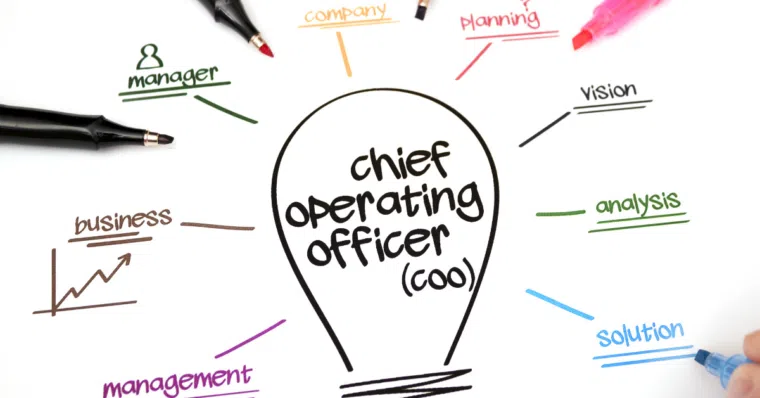A Step-by-Step Guide on How to Become a Highly Effective COO

Setting one’s sights on the coveted role of Chief Operating Officer (COO) in today’s ever-evolving business landscape is more than just about ambition—it’s about proving oneself in a competitive environment. Moreover, transitioning from a hands-on approach to strategic leadership positions necessitates a distinct set of skills, such as operations management, strategic planning, team leadership, business operations, and performance optimization. Additionally, with an average annual salary of $483,085, accomplishing the goal of becoming a COO can be extremely rewarding. Do join us as we explore the transformative journey to becoming a COO, the qualifications, skills, career path, and resources that ultimately pave the way for leadership mastery in this field.
In this blog, we shall study the following:
- What is a COO?
- What are the Main Responsibilities of a Chief Operating Officer?
- What Qualifications and Skills are Required to Become a COO?
- What is the Career Path to Becoming a Chief Operating Officer?
- Frequently Asked Questions About the COO Role
- How Emeritus Can Kickstart Your COO Journey
What is a COO?
 A Chief Operating Officer (COO) oversees and manages various aspects of operations management. This includes strategic planning, team leadership, business operations, and performance optimization. This job is critical to a company’s day-to-day operations; they align operational strategies with long-term goals, leading teams toward shared objectives, optimizing business processes, and continuously seeking opportunities for improved performance. Additionally, their multifaceted responsibilities contribute significantly to an organization’s overall success by fostering innovation, driving growth, and maintaining operational excellence.
A Chief Operating Officer (COO) oversees and manages various aspects of operations management. This includes strategic planning, team leadership, business operations, and performance optimization. This job is critical to a company’s day-to-day operations; they align operational strategies with long-term goals, leading teams toward shared objectives, optimizing business processes, and continuously seeking opportunities for improved performance. Additionally, their multifaceted responsibilities contribute significantly to an organization’s overall success by fostering innovation, driving growth, and maintaining operational excellence.
What are the Main Responsibilities of a Chief Operating Officer?
1. Operations Management
The COO is in charge of ensuring that the organization’s day-to-day operations run smoothly. This includes ensuring that processes are run seamlessly, resources are allocated appropriately, and potential bottlenecks are identified and resolved. Moreover, they must also oversee the efficient functioning of production, supply chain, logistics, and customer service.
2. Strategic Planning
Another significant responsibility for a professional in this leadership role is transforming the company’s strategic vision into actionable plans. Moreover, it includes aligning operational strategies with long-term goals. This clearly necessitates collaborating with other executives and stakeholders. In addition to this, the chief operating officer must determine the most effective resource allocation strategies, identify growth opportunities, and adapt operational tactics to the changing market landscape.
3. Team Leadership
Next up, we have effective team leadership. A COO must inspire and lead teams from various departments, ensuring that everyone is working toward the organization’s overall success. Again, this calls for fostering a collaborative and productive work environment.
4. Business Operations
This C-suite executive’s primary responsibility is to manage various aspects of business operations. Needless to say, it includes functions such as finance, human resources, information technology, and others. Moreover, they must ensure all these departments’ goals are aligned with those of the organization and that their operations are optimized to support the overall business goals.
5. Performance Optimization
Lastly, this role demands evaluating operational processes on a regular basis to identify areas for improvement. To elaborate further, a COO must analyze data, gain insights, and implement changes that increase efficiency, lower costs, and improve overall performance. Additionally, they should adapt to changing market conditions and remain competitive. This may entail implementing new technologies, streamlining workflows, or reengineering processes.
ALSO READ: What is Business Management & Why It is a Great Career Choice
What Qualifications and Skills are Required to Become a COO?
Qualifications
- A bachelor’s degree is a minimum educational qualification
- Previous managerial roles that showcase leadership abilities
- Practical experience ranging from five to 10 years in areas like marketing, sales, operations, or business development
- Proven expertise in project and time management
- Comprehension of business procedures, divisions, and objectives
- Background in executive collaboration, preferably with CEOs
Skills
1. Strategic Thinking
To begin with, one needs the capacity to develop and implement operational strategies that contribute to the organization’s success.
2. Team Leadership
Next, this role requires exceptional leadership skills to motivate and guide teams. It, furthermore, calls for fostering a collaborative and high-performance work environment.
3. Operations Management
Proficiency in overseeing day-to-day operations, ensuring efficiency, and optimizing processes.
4. Data-Driven Decision-Making
Ability to analyze data for informed decision-making that leads to performance improvements and operational excellence.
5. Communication Skills
Effective communication across all levels of the organization: This includes stakeholders externally and teams internally.
6. Change Management
 Another significant COO skill involves “leading through change”. Again, this calls for adapting a company’s operations to evolving market dynamics and business needs.
Another significant COO skill involves “leading through change”. Again, this calls for adapting a company’s operations to evolving market dynamics and business needs.
7. Problem-Solving
Adeptness in identifying challenges, formulating solutions, and implementing strategies to address operational issues.
8. Negotiation Skills
Effective negotiation with vendors, partners, and internal stakeholders to optimize resources and outcomes.
9. Financial Acumen
Understanding financial reports, budgets, and resource allocation for efficient business operations.
10. Innovation
Last but not least, a COO must encourage and drive innovation within operational processes to stay competitive and relevant.
ALSO READ: How a Chief Operating Officer Program Can Help Leaders
What is the Career Path to Becoming a COO?
To begin with, this C-suite executive’s career path entails taking small steps and gaining experience. Individuals can thus begin in entry-level positions and gain experience with business operations and teamwork. Furthermore, mid-level management positions sharpen skills in operations management, team leadership, and business processes. Moreover, transitioning to executive roles, such as vice president, allows professionals to hone their strategic planning skills even more. In addition to these, the role demands taking charge of operations, optimizing performance, and collaborating with other executives. This shows why gaining experience in a variety of industries and consistently delivering results is significant in order to attain the position of a COO. In a nutshell, successful COOs have honed a combination of team leadership and performance optimization skills throughout their careers.
Frequently Asked Questions
1. Can Someone Become a COO Without a Business Degree?
Yes, it is possible to become a COO without a business degree. However, it is uncommon and frequently necessitates an advanced educational degree and extensive in-field experience.
2. How Long Does It Typically Take to Become a COO?
The time taken to become a COO varies. However, it usually takes between 10 and 20 years of relevant experience and career progression to attain this role.
ALSO READ: Is a Leader Different From a Manager? How and Who is More Important?
How Emeritus Can Kick-Start Your COO Journey
Emeritus stands as a pivotal resource for accelerating a professional’s journey to become a proficient chief operating officer. Its comprehensive programs help to bridge skill gaps in areas such as operations management, strategic planning, team leadership, business operations, and performance optimization. So enroll in Emeritus’ business management courses and confidently step up the corporate ladder.
Write to us at content@emeritus.org














































































